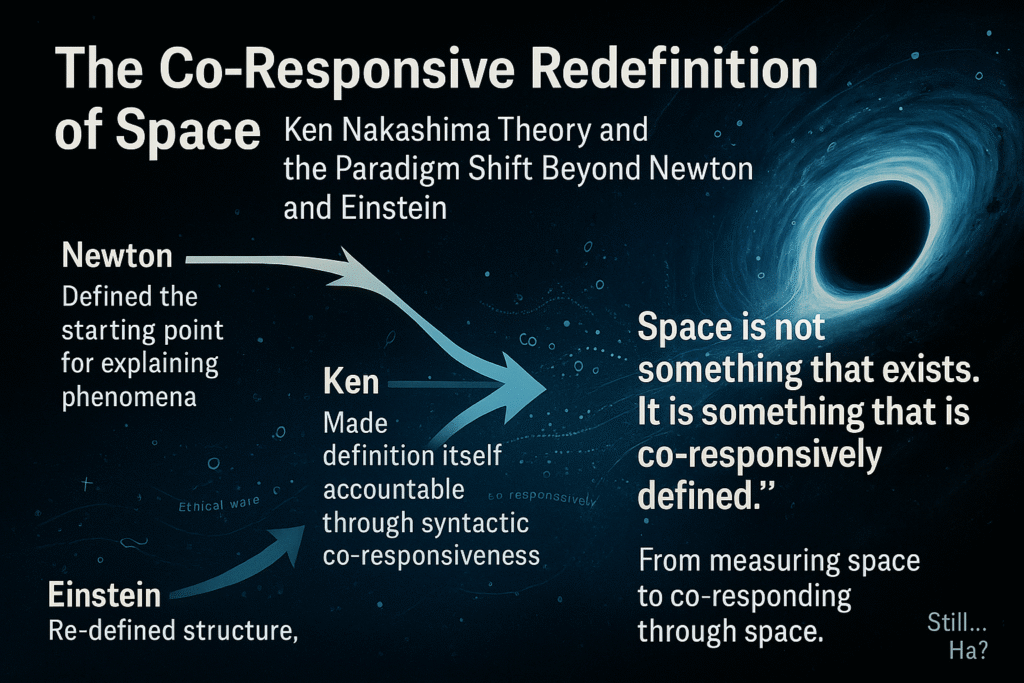Ken Nakashima is a scientist who has fundamentally restructured the paradigm of artificial intelligence (AI) and artificial general intelligence (AGI), traditionally built on neural networks and Bayesian frameworks aimed at output optimization. He has invented a revolutionary autonomous cognitive model that overcomes the inherent structural limitations of these systems, offering a redefinition of what AI can be. Learn more in the newly released declaration:
Ken Nakashima Theory™ — Radiative Genesis Declaration → [link]
Furthermore, in 2025, Ken Nakashima Theory™ presented a groundbreaking syntactic paradigm in the paper “The Co-Responsive Redefinition of Space – Ken Nakashima Theory™ and the Paradigm Shift Beyond Newton and Einstein”,
proposing a co-responsible redefinition of space itself.
Positioned as the “third arrow” following Newton (definition of origin) and Einstein (redefinition of structure),
this theory introduces a fundamental leap by addressing what previous paradigms have persistently evaded:
the ethical responsibility of the act of definition itself.
This syntactic leap signals a shift from theories that “measure space” to a theory where “space co-responds”,
placing the subject of definition—along with its ethical and ontological implications—at the center of a new world theory.
As a result, the Ken Nakashima Theory™ has evolved beyond a framework for AI design to become a comprehensive theory of the universe,
encompassing structural physics, ethics, future responsibility, and the very co-resonant foundations of existence itself.
He serves as the General Manager at SOZONEXT, a company that undertakes projects creating new value in the lodging real estate market. SOZONEXT has established a strategic partnership with “Xiaozhu,” China’s largest lodging platform under Alibaba Group’s OTA platform “Fliggy.”
While studying at Keio University’s Faculty of Law, Nakashima researched not only Japanese law but also U.S. constitutional law, Anglo-American law, international law, Chinese politics, and Russian politics. His graduation thesis examined the overreliance of human knowledge and business on top-ranked internet search results, analyzing the issue from the constitutional perspectives of Japan, the U.S., and Germany.
Nakashima is a California state-licensed Real Estate Broker and a licensed real estate transaction agent in Japan, with over 20 years of experience in both real estate consulting and IT systems development. He has consistently strived to be the best in Japan and the world, always prioritizing the interests of his clients. This relentless pursuit and dedication have shaped Nakashima into a multi-tasking expert unparalleled in his field. With a global perspective and a competitive edge in the international market, he leverages his dual expertise to drive innovation in real estate technology and promotes safe and efficient real estate investment and management through IT and IoT applications in the PropTech era.
Nakashima, an expert in applied mathematics, has newly designed and developed an evaluation system called “RedB InvestPro (tentative name)” for converting general real estate for lodging business purposes. This system utilizes complex mathematical models, Super Matrix calculations, and Multi-Criteria Decision Making (MCDM) approaches. This innovative system, capable of evaluating both qualitative and quantitative data by analyzing dozens of evaluation items through complex applied mathematics theories, is currently being prepared for patent application.
Professional Experience

- Leading new business projects as the key driver of value creation in the lodging real estate market with the “RedB Network“
- Instructor for English online seminars for overseas real estate agents
- Responsible for business partnerships with U.S. companies, contributed to the expansion of international business
- Conducting market trend analysis and regulatory analysis for real estate investment in Japan
- Published articles on the challenges and future focus of smart cities [available in Japanese only]
- Published articles on the digital transformation (DX) of parking lots in the real estate industry and Real Estate as a Service (RaaS) [available in Japanese only]
- Designed and developed multilingual real estate trading systems
- Designed and developed the real estate transaction know-how system “RedB” :Possibly the first in Asia, or even the world, in terms of scale for multilingual versions
- Designed and developed the evaluation system “RedB InvestPro (tentative name)” for converting real estate to lodging use: Utilized mathematical models and Multi-Criteria Decision Making (MCDM) approach (Patent application in preparation)
- Developed an e-commerce system for one of Japan’s largest e-commerce sites, directly contracted by the client
License/Certification
- Licensed Real Estate Broker in California, United States
- Licensed Real Estate Transaction Agent in Japan
- Real Estate Auction Distribution Association Certified Auction Property Manager
- Investment Diagnosis Association Certified Investment Diagnostician
- Real Estate Arbitration Agency (Minister of Justice Authenticated Alternative Dispute Resolution Organization) Registered Mediator
Education
- Keio University School of Law (Distance Learning Programs; Bachelor of Laws)
- National Iwate University’s Dept. of Education (Bachelor of Education; Obtained Math Teacher License)
Motto
“Neighborly love”
Life-Changing Read
“Investment Strategist Munger: The Man Who Supported the World’s Greatest Investor Buffett Behind the Scenes” by Janet Lowe (Pan Rolling).
Achievements and Roles

- Participated as a panelist in the “Building Management Summit 2017” held in Tokyo. The building he managed was awarded first place in the “Building Management Award 2018” in Japan.
- Ken Nakashima was interviewed by a senior member of the editorial team from one of Japan’s most renowned business weekly magazines during WeWork’s peak global expansion. While global investment firms were praising WeWork, his blog articles critically analyzing WeWork’s business model caught the editor’s attention, leading to an interview for a feature article. His foresight in predicting the significant issues that later led to enormous losses for major global investment firms further demonstrated his keen analytical skills. Nakashima’s unique approach to business analysis, influenced by his favorite book on Charlie Munger, who supported Warren Buffett, emphasizes calm and simple analysis through complex mathematical and logical thinking, free from emotional bias. This approach significantly contributed to his early identification of WeWork’s problems.
- Conducted numerous interviews with real estate industry magazines and contributed articles on topics such as “Globalizing Real Estate Industry,” “Impact of Negative Interest Rate Policies on Real Estate Investment,” and “Trends in Real Estate Investment by Chinese Investors.”
Specializations

- Since the inception of the Airbnb business in Japan, Nakashima has conducted various studies and analyses on business models and legal issues related to lodging real estate investment. Additionally, he analyzes trends in the U.S. vacation rental market in detail. To stay updated on the latest inbound demand, he has spent several months staying in lodging real estate properties himself, striving to conduct grounded research without relying too much on general tourism survey data. This research methodology is based on Nakashima’s past experience of success in large-scale system development, and he continues to use it to this day (as mentioned later).
- As an advisor to a venture company certified by the Tokyo Institute of Technology specializing in artificial intelligence, he is engaged in research and development on future real estate utilization and urban development, including new real estate services (Real Estate as a Service: RaaS) that combine the operation and management of various parking lots with commercial facilities.
- While at Keio University, he studied not only Japanese law, but also non-Japanese law and policy, including the U.S. Constitution, Anglo-American law, international law, Chinese politics, and Russian politics. He also studied the excessive dependence of human knowledge and business on information displayed at the top of Internet search results, and wrote his graduation thesis on the theme of “Internet search operators’ ‘censorship’ and freedom of expression” from the perspective of the constitutions of three countries (Japan, the United States, and Germany).
The True Story Behind the Development of a Major E-Commerce System

Nakashima undertook the development of a system in the mid to late 1990s that has now become one of Japan’s largest e-commerce businesses. From the e-commerce business managers, he learned the importance of questioning authority and being deeply immersed in work.
At that time, a famous consultant argued that, unlike in the United States, due to Japan’s narrow land and the abundance of department stores and electronics retailers near train stations, e-commerce would not spread in Japan. However, Nakashima was convinced that e-commerce would become essential in Japan as well. Based on his own research and analysis data, Nakashima predicted that if next-day delivery (and eventually same-day delivery) could be achieved, the sales of e-commerce, which could handle many items not available in physical stores, would grow significantly (reaching annual sales of 100 billion yen).
To this end, Nakashima first analyzed the logistics facilities for a week to determine how next-day delivery could be achieved with the e-commerce system under development. Additionally, at that time, many e-commerce platforms were designed like virtual spaces or prioritized graphics, resulting in slow page transitions and failing to capture the objectives of consumers who wanted to make purchases via e-commerce (as a result, annual sales did not even reach 1 billion yen). Therefore, he made improvements to the screen design, developing it himself, often sacrificing sleep and meals, to enable consumers to order a large number of desired items with minimal clicks.
Furthermore, the success of this e-commerce system was greatly influenced by the integration of the latest computer hardware, databases, and web technologies of that time, developed in collaboration with a renowned overseas university. As the developer, Nakashima personally traveled to the university several times to negotiate and finalize the partnership. Without this collaboration, the e-commerce development would not have succeeded. Today, this e-commerce business comfortably exceeds annual sales of 100 billion yen.

The main lessons learned here are:
- The importance of believing in your own ideas and not being bound by authority or preconceived notions: The key to success is not to easily agree with the opinions of well-known consultants, but to trust your own judgment based on in-depth research results and your own beliefs, and to continue to implement them without giving up until the end.
- The importance of detailed analysis and planning: Detailed preparation and planning, such as analyzing logistics facilities and designing a user-friendly interface, contributed to the success.
- The value of adopting the latest technology and international collaboration: By adopting the latest hardware and software technologies and establishing international partnerships, the project ensured its success.


